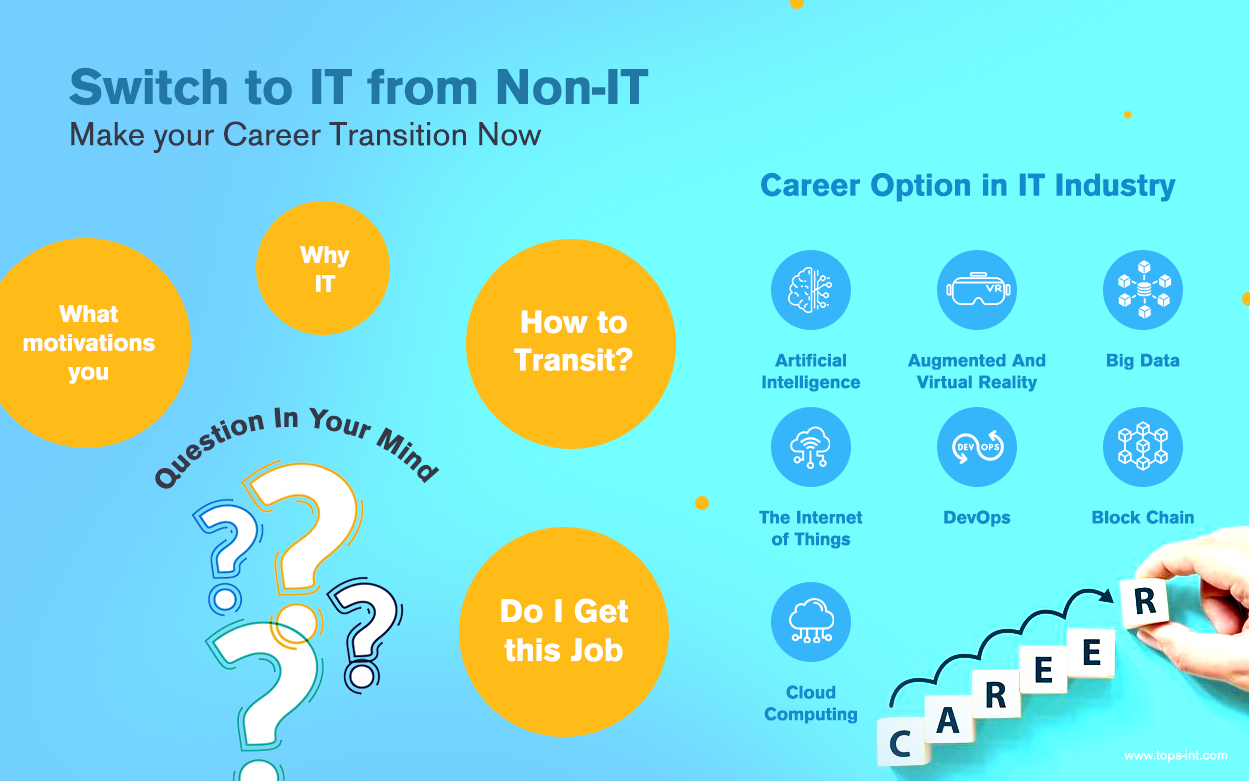
Even if it can appear complicated, changing to a profession in IT is doable. If you Enroll in one of the best IT Training Institutes then transitioning can become very easy. Anybody who wants to work in IT may discover a position that matches their abilities, interests, and capabilities. In addition, several of your soft skills may apply to a job in information technology. The abundance of IT professions is one of their finest features. Just choose the best option for you, then develop a strategy to get the experience and qualifications you need to sell yourself to recruiters. Finally, consider taking concrete actions to transition into the IT industry effectively. Making a career transition from a non-IT field to IT can be daunting, but with the proper training and support, it is achievable and can lead to a fulfilling and lucrative career.
According to the data on career transitions, individuals move careers 5-7 times over their working lives. You might have thought of changing careers at any stage of your life. All you need is a desire and the appropriate route to begin your new job. You have chosen the best site if you are considering how to start an IT profession. We will provide you with all the information you need to establish yourself as an employee in the IT industry.
Why would you want to change careers? People change occupations for a variety of reasons. You might not be happy with your current job, be interested in using technology to solve problems in the real world or want to learn more. No matter what it is, you should figure it out first. Knowing precisely what you did not like about your last job will help you determine what you want in the new one. Knowing why you want to change careers and work in IT is always good.
Why choose an IT career?
The day when only people with degrees in computer science and information technology were eligible for IT employment is gone. Even though your academic background is not in information technology, you can transition into an IT professional if you have the necessary abilities. Before COVID-19, it was infamously tricky for software engineers to find high-paying and high-stakes employment. Many professionals are considering a non-IT to IT career transition due to the high demand and growth in the technology industry. With the right skills and training, a non-IT professional can successfully switch to an IT career and enjoy a lucrative and fulfilling job.
People who are not technical are just as eager as everyone else to change careers. If you want a chance to be one of them, you have come to the right place. So, here are some things to think about before you start your journey:
- What motivations drive your urge to update to modern technology?
- Which aspect of computers do you find most comfortable?
- How Do You Transition from a Service-Based Business to One That Sells Real Products?
- Why IT?
- Do LinkedIn posts from professionals that ask, "Do you wonder if you could get one of these jobs?" scare you?
This article will teach you the strings if you are concerned about entering the IT business. In this era of massive layoffs in the IT business, individuals in sales and marketing are attempting to pick up new skills. So, start learning now!
Every year, companies selling services and products look for people who know much about technology. With that in mind, let us answer the most common question: How can people who do not know much about technology get into it? All you need to get started in IT is the right set of skills.
Regardless of your level of expertise, this article will provide a guide to strictly adhere to if you want to enter the IT sector. Given how often technology appears in movies and advertisements, many of us find the IT industry interesting. In addition, many individuals are believed to choose this industry due to the salary and work environment. In every industry, employers place a greater emphasis on competence than on academic background. Therefore, you may pursue an IT professional in various in-demand specialisations. They need not be full-stack developers, data scientists, or ML engineers. This blog will help you realise your full potential if you are a recent graduate with a non-technical degree who wants to work in the IT industry.recent graduate with a non-technical degree who wants to work in the IT industry.
What Is Your IT Career Goal?
Who or what do you most admire? Are you seeking a job enabling you to utilise your creativity while providing competitive compensation and benefits? Why did you embark on a new career path in information technology? Do you crave to use technology to solve critical societal issues? Understand why you decided to change careers. Why did you choose to change careers and pursue a career in information technology? With the increasing demand for technological skills, more and more people are considering switching from Non-IT to IT jobs to secure their future career prospects. Deciding to transition from Non-IT to IT jobs is a bold move, but anyone can successfully make the switch and thrive in the tech industry with the right mindset, determination, and skill development.
Try a roadmap from TOPS Technologies career experts and find the career pathways that are a good match for you based on how you react to this inquiry. With the growing demand for technology, many individuals are considering switching from Non-IT to IT jobs to stay relevant and competitive in today's job market. Making a career transition from Non-IT to IT jobs can be daunting, but with the right mindset, training, and support, it can lead to a rewarding and fulfilling career path.

Career Options in the Technology Industry
Find your passion since there are several job prospects in information technology. Please remember to be transparent while selecting the most extraordinary IT path. Using PayScale statistics, this post will discuss some top IT careers with reasonable compensation and scope.
Artificial Intelligence
Artificial intelligence is one of the most in-demand skills in the IT business. An artificial intelligence architect may employ a top AI technology framework to solve real-world difficulties. The following skills are required for an AI job:
- Programming languages (Python, R, Java, etc.)
- Statistics and probability distribution
- Algorithms and frameworks
- Neural networks and deep learning
Augmented And Virtual Reality
The digital world's level has risen due to augmented and virtual reality. The best 3D virtual technology allows people to interact with their surroundings in real-time. To work as an AR or VR engineer, you must have the following skills:
- Programming languages have easy syntax, such as Java, C#, Swift, JavaScript, etc.
- 3D game engine skills, UI or UX designers
Big Data
Big data technologies and apps enable organisations to combine and analyse massive volumes of industrial data. This contributes to the growth and profitability of enterprises by providing adequate results. Yet, Big Data professionals have been scarce in the IT business, so if you want to be a Big Data Engineer, now is the time to get the necessary skills. First, the following skills must be developed:
- Skills in coding (Python, R, SQL, Scala, etc.)
- Hadoop, Spark, and NoSQL are examples of such technologies.
- Massive data structures
- Data Lake
The Internet of Things
If you are interested in employing cutting-edge IoT devices to address real-world problems, you will be ready to begin your IoT career with the following skills:
- SQL, MySQL, MariaDB, PostgreSQL, and Python are among the programming languages available, as are C, C++, Java, and Python.
- Machine Learning and Artificial Intelligence
- Apache Spark and Hadoop
DevOps
DevOps training is a highly sought-after skill that demands you to be both a developer and an operator. Aspiring professionals can gain the skills and knowledge required to transition into the IT industry by enrolling in DevOps training courses. DevOps training programs offer hands-on experience with various tools and technologies, preparing professionals for the demands and challenges of the modern IT workplace. In addition to the technical skills given below, you must be an excellent communicator with a strong sense of collaboration if you want to become a DevOps Engineer:
- DevOps Tools Programming Dialects (Git, Jenkins, Docker, Puppet, etc.)
Blockchain
A blockchain developer should be able to design and build a secure Blockchain-based solution. To become a blockchain engineer, you will need the following tools on your CV:
- Java, C++, and Python are examples of programming languages.
- In addition, blockchain architecture and encryption are fundamental concepts in web development.
Cloud Computing
Cloud computing is a service that provides a range of tasks over the Internet to help organizations expand. These functions include servers, storage, databases, networking, software analytics, and intelligence. You may become a cloud computing specialist by acquiring the following skills:
- Solid knowledge of programming languages such as PHP, Java, and .NET
- An understanding of cloud architecture
- Practical knowledge of cloud computing platforms such as Amazon, Azure, etc.
How to Get Into the IT Industry
Let us look at the measures you must take in this area to get your dream IT job. It will be challenging for you to master the technologies mentioned above if you are changing careers from a non-engineering background without having a fundamental grasp of programming languages. You need to initially study programming languages before working on any IT technology. The most popular programming languages now are Python and Java, followed by C, C++, Java, and Python. Python is the language used by the majority of modern technology. Thus, master these programming languages to have a handle on the fundamentals before moving on to your preferred IT career path.
Also Read: Complete Guide To Starting Your Career In Web Development

Create A Particular Roadmap
To succeed, you must lay out a plan for getting there. First, choose one particular objective that you want to strive towards. Then, create a plan for acquiring the abilities needed for the position you want. Plan appropriately after that. Maintaining a timetable is essential to keep track of your progress, and how near you are to your objective. It encourages you to pursue your goal. It is time to start if you have selected the right job and made all your plans for achieving it. Planning everything out in advance does not guarantee success, however. Start gaining knowledge now. Work hard to convince your subconscious that you will become whatever you desire.
Get The Needed Skills
It will be difficult for you, but it is possible if you come from something other than an engineering background. You may sign up for an e-learning site and begin studying there. You should start studying programming languages. Even for computers, language is a necessary kind of communication. Learning primary programming languages will help you understand the essential technologies if you want to work in IT. You may begin studying the tools required for your intended vocation if you are proficient in programming languages. IT Training is an essential for individuals who want to upskill or reskill themselves in the IT industry to stay ahead of the competition and secure better job prospects. Whether a fresh graduate or an experienced professional, IT Training can equip you with the necessary skills and knowledge to succeed in various IT roles, such as data analyst, software developer, cybersecurity specialist, and more.
Explore Initially
Start making connections with folks who currently hold the position you want or with those who have changed careers to work in IT. First, tell them about your aspirations for your career. Then, consider their advice, assess it, and strive to put the workable solutions into practice. Do use social media, the Internet, and online resources like LinkedIn. You may network with people from different firms using these platforms, which can help you find the job you want.
Get Practical Experience
A man becomes excellent with practice, and he becomes wiser with age! You must thus attempt to apply what you learn in real-life situations in addition to knowing it. Enroll in an online certification programme that will enable you to obtain practical experience. After you do, you may practise everything you have learnt and attempt to develop new ideas independently. Afterwards, you may begin your career as an intern at any IT firm, which will aid in the development of your knowledge of different tools and technologies and likely lead to the discovery of further new information. It will be a fantastic chance to put everything you have learnt up until then into practice. However, you will get the confidence to advance in your job along that process.
Be Patient
The last piece of advice is to be patient. It is challenging to change careers. Learning new skills, practising them, and settling into a new profession takes time. Avoid comparing yourself to others. It will come into place with time and work.
Choose A Job Role That Fits Your Goals.
To choose an IT career, read IT job descriptions and consult IT experts. Do the appropriate amount of research. You may need to watch "day in the life" videos on YouTube and the CompTIA website and attend educational webinars.
Speak With Individuals Who Are In The Position You Want
Examine your LinkedIn network and discuss your planned job shift with friends and family. To arrange a meeting for an informational interview, locate someone who currently holds the position you seek and get in touch with them. This will enable you to ascertain how they obtained the desired position and encourage you to consider how you may use the same strategies.
Find A Mentor.
If you join a professional group, you can find a mentor in your dream job. A mentor may guide you while you take the necessary steps to transition to your ideal profession successfully. As you develop your talents and hunt for employment, a mentor may also assist you in making the required connections and establishing the proper objectives for yourself.
Evaluate Training Options and Research Your Needs
You can self-study in your free time at home, utilising tools like Lynda.com and MOOCs to get the needed skills. Books that teach IT skills or enrolling in workshops or tech boot camps may also be beneficial. In addition, you may test CompTIA CertMaster for IT Basics to learn essential IT skills.
Think About Being Certified
Find out what certification choices are available. To learn more about the many certifications available and how they may help you become a more marketable job applicant, look at certification programs from universities online or start a crash course. If you significantly change your job, having the appropriate certificates on your CV might mean the world. For Example, DevOps training not only equips individuals with the technical competencies needed for IT roles but also emphasises the importance of collaboration, communication, and problem-solving skills that employers highly value. With the increasing demand for Python professionals, investing in Python training can be a smart move for individuals looking to future-proof their careers in the IT industry.
Improve
Play around with new pieces of stuff on your computer. Depending on your intended career path, you could develop your website, experiment with open-source software, or create a database. With the equipment you currently have at home, you may acquire many skills required for IT professions by trial and error.
Look At Other Educational Options.
Many information technology occupations do not need you to return to school, but some could. If this is the situation with your intended job, you could look for the best alternative at a university. Online courses are becoming more and more common at respected universities, and they might be a more flexible alternative if you are still waiting to be ready to leave your present employment.
Get Practical Experience
Hands-on experience can come from something other than full-time, paid employment. Moreover, you may get it via voluntary work, apprenticeships, part-time employment, and internships. Speak with organisations that utilise your help and will let you get work experience. Most IT jobs do not provide paid training when you start working there, but some do. Check into the possibilities for employer-sponsored training in your selected sector.
Determine Further Skills Gaps
Examine the skills you have learned and contrast them with those required by job listings. Next, get more educational materials to assist you to fill up any gaps if you still need them. Finally, take our free career assessment to determine which IT occupations suit your current abilities.
Customise Your CV For It
Focus on the abilities and experience you have that are relevant to the positions you are seeking by using the same language found in job descriptions. Be sure to emphasise all of your transferrable talents while creating your resume. Read up on how to choose the best kind of resume and attract more hiring managers.

Network
You should cast a broader network, introduce yourself to as many IT experts as possible, and schedule informative interviews and locate an IT mentor. Attend conferences, networking events, and meetings hosted by professional associations. An excellent tool for online networking is LinkedIn. Be careful to connect online with the individuals you meet at networking events and keep your LinkedIn page current. Your job hunt may be significantly aided by knowing the appropriate people in the pitch who can connect you with hiring managers as openings become available. A 2016 poll conducted by LinkedIn found that 85% of job searchers get employment via networking. So pay attention to the effectiveness of growing your network!
Conclusion
Keep in mind that changing careers involves work, time, and patience. Avoid trying to take on numerous new duties at once to minimise exhaustion. If you are patient with yourself, you may gradually develop new skills. Remember that everyone learns at their own pace and that no one becomes an IT expert overnight. People in today's IT-centered world use various technologies to develop innovative solutions to critical difficulties. You should concentrate on selecting the position for which you want to apply now because you've got ideas about your abilities and how to improve them for an IT job.
Some occupations are in high demand now and will remain so. Examples include ML engineering, AI-related jobs, big data and data scientist positions, and full-stack web developers. Given the market's current trajectory, these skills will most certainly be in demand over the next 10 years. These innovations continue to amaze us and have become our daily life. As a result, it is natural to be interested in changing occupations to work in digital technologies, and it is easy if you have the essential skills.
Best IT Training With 100% Placement Assistance
Are you prepared to advance your IT abilities? Look no further than
TOPS Technologies, a recognised name for the past 15 years in IT training and placement. We are your entryway to a prosperous IT profession with a track record of successfully placing over 1 lakh students and partnering with over 3000 firms.
Do you aspire to work for renowned organisations? We create doors to intriguing job prospects thanks to our vast partnerships with over 3000 organizations. Do you want to study under the best? Our staff of knowledgeable instructors is available to help you at every turn. Are you seeking training that is both practical and hands-on? We have your back. With 15 years of IT training and placement expertise, TOPS Technologies has made a name for itself as a reliable brand.
Are you prepared to join the family of TOPS Technologies? For further inquiries regarding the TOPS Technologies Course, reach out to us at
inquiry@tops-int.com or call us at
+91 – 7622011173 for a free demo.
We provide the best
IT Course in Ahmedabad, Surat, Vadodara, Ahmedabad, Rajkot, and Nagpur with live projects and 100% placement assistance.
FAQs
1. Why Should I Go From Non-IT To IT?
There are a variety of reasons you would wish to transition from non-IT to IT, including:
- The information technology sector is a dynamic one with many job opportunities.
- IT skills are in great demand and might improve your chances of employment and increase your pay.
- IT may allow you to apply your creativity and problem-solving skills to develop original solutions for actual situations.
- IT can provide you freedom and control over your workday and schedule.
2. How Can I Go From Non-IT To IT?
Going from non-IT to IT is feasible, but it takes some planning and preparation. Here are some tips:
- Pick a field that interests you, fits your abilities, and aligns with your objectives. You may explore a variety of fields, including software engineering, cybersecurity, data science, and web development.
- Study programming and coding fundamentals via tutorials, books, online courses, etc. Start with learning languages like Python, Java, C++, etc.
- Create a portfolio and highlight your work on websites like GitHub, LinkedIn, etc. You may also participate in contests and hackathons to obtain exposure and experience.
- Develop relationships with mentors and other IT experts who can help and provide feedback. You may connect with like-minded individuals by joining online communities, forums, organisations, etc.
- Submit your application for IT jobs matching your experience and interests. To get real-world experience and contacts, you might also explore volunteer, freelancing, or internship opportunities.
3. What Difficulties Arise While Moving From Non-IT To IT?
Although it might be difficult, transitioning from non-IT to IT is not impossible. Here are a few typical difficulties you could experience:
- Absence of formal IT training or certification. You may need to demonstrate your abilities and expertise via your projects, certifications, and portfolio.
- You may face competition from individuals with greater IT experience or qualifications. It can be necessary for you to distinguish yourself from the competition by emphasising your unique skills.
- Resistance or scepticism from coworkers or bosses who could question your commitment to or ability to make the transfer to the IT sector.
4. What Are The Advantages Of Moving From Non-IT To IT?
Switching from non-IT to IT may help you prosper in your career. Some advantages are:
- Explore other IT domains, positions, sectors, etc., may give you additional alternatives and choices for your professional path.
- You can also learn new things that will benefit you in other areas of your life.
- You could make new friends who can encourage and motivate you on your trip.
5. How Can I Get IT Education And Employment In India?
If you want IT training and placement in India, you should consider enrolling in a recognised institution that provides top-notch courses and placement support in various IT fields. You should consider the following while choosing an institute:
- Faculty and curriculum: The institution needs a solid curriculum that addresses both academic and practical aspects of the IT sector. The professors need to have expertise in their disciplines and credentials.
- Infrastructure and facilities: The institution should contain the necessary classrooms, libraries, and other learning and development-supporting spaces.
- Placement support: The institution should have a solid network of contacts and a track record of placing students in positions that suit them at reputable businesses.
One institution that satisfies all these requirements is TOPS Technologies, one of
India's top IT training institutes with more than decades of expertise. With
100% job placement assistance, TOPS Technologies provides a range of courses in web development, software testing, mobile app development, and digital marketing.
Enroll today!









